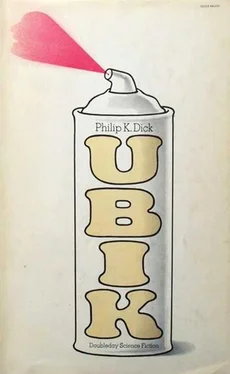“Nobody knows that any more; that’s the old name for the Brooklyn Dodgers.” He eyed Al suspiciously.
Joe said, “We better go upstairs. And make sure they’re all right. Before we take off for Des Moines.”
“If we don’t get to Des Moines soon,” Al said, “it may turn out to be an all-day trip or even a two-day trip.” As methods of transportation devolve, he thought. From rocket propulsion to jet, from jet to piston-driven aircraft, then surface travel as the coal-fed steam train, horse-drawn cart—but it couldn’t regress that far, he said to himself. And yet we’ve already got on our hands a forty-year-old tape recorder, run by rubber drive-tire and belts. Maybe it could really be.
He and Joe walked rapidly to the elevator; Joe pressed the button and they waited, both of them on edge, saying nothing; both withdrew into their own thoughts.
The elevator arrived clatteringly; the racket awoke Al from his introspection. Reflexively he pushed aside the iron-grill safety door.
And found himself facing an open cage with polished brass fittings, suspended from a cable. A dull-eyed uniformed operator sat on a stool, working the handle; he gazed at them with indifference. It was not indifference, however, that Al felt. “Don’t get in,” he said to Joe, holding him back. “Look at it and think; try to remember the elevator we rode in earlier today, the hydraulic-powered, closed, self-operated, absolutely silent—”
He ceased talking. Because the elderly clanking contraption had dimmed, and, in its place, the familiar elevator resumed its existence. And yet he sensed the presence of the other, older elevator; it lurked at the periphery of his vision, as if ready to ebb forward as soon as he and Joe turned their attention away. It wants to come back, he realized. It intends to come back. We can delay it temporarily: a few hours, probably, at the most. The momentum of the retrograde force is increasing; archaic forms are moving toward domination more rapidly than we thought. It’s now a question of a hundred years at one swing. The elevator we just now saw must have been a century old.
And yet, he thought, we seem able to exert some control over it. We did force the actual contemporary elevator back into being. If all of us stay together, if we function as an entity of—not two—but twelve minds—
“What did you see?” Joe was saying to him. “That made you tell me not to get in the elevator?”
Al said, “Didn’t you see the old elevator? Open cage, brass, from around 1910? With the operator sitting on his stool?”
“No,” Joe said.
“Did you see anything?”
“This.” Joe gestured. “The normal elevator I see every day when I come to work. I saw what I always see, what I see now.” He entered the elevator, turned and stood facing Al.
Then our perceptions are beginning to differ, Al realized. He wondered what that meant.
It seemed ominous; he did not like it at all. In its dire, obscure way it seemed to him potentially the most deadly change since Runciter’s death. They were no longer regressing at the same rate, and he had an acute, intuitive intimation that Wendy Wright had experienced exactly this before her death.
He wondered how much time he himself had left.
Now he became aware of an insidious, seeping, cooling-off which at some earlier and unremembered time had begun to explore him—investigating him as well as the world around him. It reminded him of their final minutes on Luna. The chill debased the surfaces of objects; it warped, expanded, showed itself as bulblike swellings that sighed audibly and popped. Into the manifold open wounds the cold drifted, all the way down into the heart of things, the core which made them live. What he saw now seemed to be a desert of ice from which stark boulders jutted. A wind spewed across the plain which reality had become; the wind congealed into deeper ice, and the boulders disappeared for the most part. And darkness presented itself off at the edges of his vision; he caught only a meager glimpse of it.
But, he thought, this is projection on my part. It isn’t the universe which is being entombed by layers of wind, cold, darkness and ice; all this is going on within me, and yet I seem to see it outside. Strange, he thought. Is the whole world inside me? Engulfed by my body? When did that happen? It must be a manifestation of dying, he said to himself. The uncertainty which I feel, the slowing down into entropy—that’s the process, and the ice which I see is the result of the success of the process. When I blink out, he thought, the whole universe will disappear. But what about the various lights which I should see, the entrances to new wombs? Where in particular is the red smoky light of fornicating couples? And the dull dark light signifying animal greed? All I can make out, he thought, is encroaching darkness and utter loss of heat, a plain which is cooling off, abandoned by its sun.
This can’t be normal death, he said to himself. This is unnatural; the regular momentum of dissolution has been replaced by another factor imposed upon it, a pressure arbitrary and forced.
Maybe I can understand it, he thought, if I can just lie down and rest, if I can get enough energy to think.
“What’s the matter?” Joe asked, as, together, they ascended in the elevator.
“Nothing,” Al said curtly. They may make it, he thought, but I’m not going to.
He and Joe continued on up in empty silence.
As he entered the conference room Joe realized that Al was no longer with him. Turning, he looked back down the corridor; he made out Al standing alone, not coming any farther. “What’s the matter?” he asked again. Al did not move. “Are you all right?” Joe asked, walking back toward him.
“I feel tired,” Al said.
“You don’t look good,” Joe said, feeling deeply uneasy.
Al said, “I’m going to the men’s room. You go ahead and join the others; make sure they’re okay. I’ll be along pretty soon.” He started vaguely away; he seemed, now, confused. “I’ll be okay,” he said. He moved along the corridor haltingly, as if having difficulty seeing his way.
“I’ll go with you,” Joe said. “To make sure you get there.”
“Maybe if I splash some warm water on my face,” Al said; he found the toll-free door to the men’s room, and, with Joe’s help, opened it and disappeared inside. Joe remained in the corridor. Something’s the matter with him, he said to himself. Seeing the old elevator made a change in him. He wondered why.
Al reappeared.
“What is it?” Joe said, seeing the expression on his face.
“Take a look at this,” Al said; he led Joe into the men’s room and pointed at the far wall. “Graffiti,” he said. “You know, words scrawled. Like you find all the time in the men’s room. Read it.”
In crayon, or purple ballpoint pen ink, the words read:
JUMP IN THE URINAL
AND STAND ON YOUR HEAD.
I’M THE ONE THAT’S ALIVE.
YOU’RE ALL DEAD.
“Is it Runciter’s writing?” Al asked. “Do you recognize it?”
“Yes,” Joe said, nodding. “It’s Runciter’s writing.”
“So now we know the truth,” Al said.
“Is it the truth?”
Al said, “Sure. Obviously.”
“What a hell of a way to learn it. From the wall of a men’s room.” He felt bitter resentment rather than anything else.
“That’s how graffiti is; harsh and direct. We might have watched the TV and listened to the vidphone and read the ’papes for months—forever, maybe—without finding out. Without being told straight to the point like this.”
Joe said, “But we’re not dead. Except for Wendy.”
“We’re in half-life. Probably still on Pratfall II; we’re probably on our way back to Earth from Luna, after the explosion that killed us—killed us, not Runciter. And he’s trying to pick up the flow of protophasons from us. So far he’s failed; we’re not getting across from our world to his. But he’s managed to reach us. We’re picking him up everywhere, even places we choose at random. His presence is invading us on every side, him and only him because he’s the sole person trying to—”
Читать дальше








